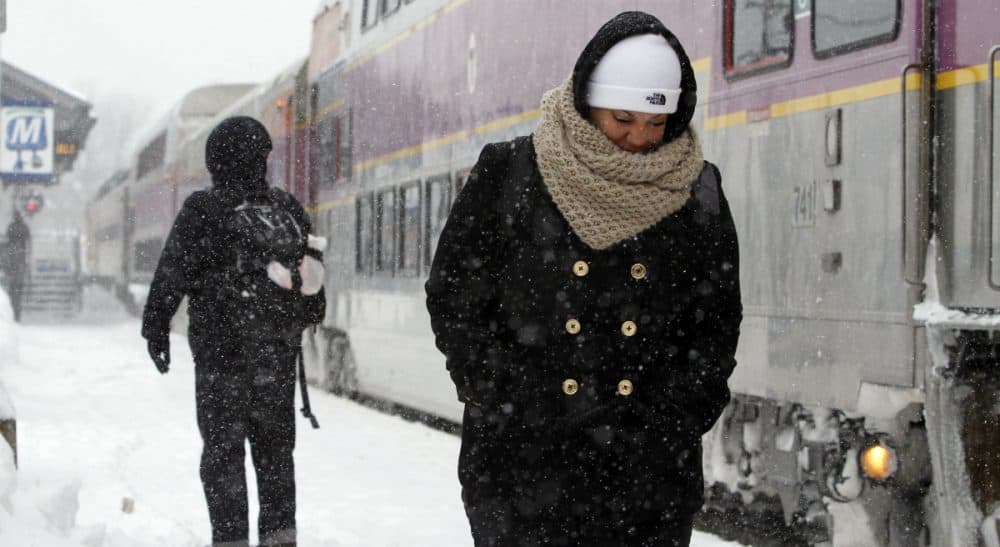Advertisement
On Transportation, Turning Grumbling And Frustration Into Action

Haven’t we studied, reorganized, refined the reorganization and special commissioned our transportation system enough over the past years? Have we not the grounds to just declare our total dissatisfaction with the current unacceptable levels of service disruptions? The time to act is now.
Some people are posing high level policy sounding questions like:
“What kind of a transit system do we truly want to have in Greater Boston?”
“How much can we really afford?”
Well, here are some clear, direct and simple answers to those questions:
We want a transit system that works — in good weather and bad.
We want a system that can reliably and efficiently get people to work in the morning and get them home at night.
And we want a transit system that is working, available and accessible to students, to the elderly and to all people who rely on it for their mobility.
It’s really not that complicated. The data must tell you that something is wrong with the present system.
We have all recently experienced life in greater Boston when public transportation is shut down, interrupted or operating “with delays.” Lots of people simply couldn’t get to work. Or gave up trying. And for those who turned to their cars as an alternative, their commute (and everybody’s commute) was twice as long.
So what can we do? Here are a few places to start:
1. Resolve that a working, reliable transit system is simply required for a 21st century economy in a world-class city.
Advertisement
2. Figure out what it costs to run a modern transit system in Boston (and the cost of the whole transportation system for that matter) within the current “reformed” Massachusetts Department of Transportation (MassDOT) structure.
3. Make necessary structural changes immediately. This includes removing obstacles to privatization, and fixing the role and control of the MassDOT board so that the governor is able to take responsibility of the system. If you can’t make the system work, put the whole thing or parts of it out to bid and see if a private operator can do better.
4. Enough talk about the MBTA’s “state of good repair backlog.” Act on it now. Clearly, we must invest in the infrastructure needed to modernize the MBTA and make it operate in an efficient and reliable manner. Thanks to the work of David D’Alessandro several years ago, we all know what that is. Update the report and act.
5. Finally, once we have a system in place that is worthy of investment, raise the revenue required for MassDOT to run an efficient, modern transportation system across the commonwealth. This is a major sticking point for some -- but it shouldn’t be. Put tolls of $1 or $2 on I-93 and on 128. (Rates could be adjusted for short or long trips — especially on 128 with the use of open road/ electronic tolling.) Like many more up-to-date systems across the country, use the funds to fix both the roads and the MBTA at the same time. (Remember, the MBTA rider provides congestion relief to the highway user.) And recall, the fact that we only have tolls on traffic coming from the west on the Pike, over the Tobin Bridge from the north and via the tunnels, is a simply an accident of history of how the original funding of this infrastructure was secured. In the 21st century, it is both unfair and nonsensical that other similar highways users inside Boston’s Metropolitan Highway System are not tolled. Tolls are simply a user fee to pay for the cost of essential infrastructure. They are not a tax. If you are against tolls, but want your roads and bridges to be safe and uncongested, then maybe you would be for adopting a vehicle miles-traveled fee, which could be collected annually when the car is inspected.
We can spend lots of money on promotional tours and campaigns for the 2024 Olympics. But let’s not forget what we have just lived through in 2015.
We can spend lots of money on promotional tours and campaigns for the 2024 Olympics. But let’s not forget what we have just lived through in 2015. Let me say it again, because it bears repeating: A functioning transportation system is essential to a 21st century, world class, economic hub.
In many ways, the recent experience was a blessing: We had the opportunity to see what a total collapse of our transportation system was like without the loss of a single life. But this blessing will be lost if we fail to act on what we now know. This crisis should not be wasted. It’s time to fix Massachusetts’ transportation system. Now.
